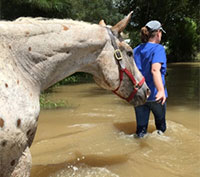
Photo by Renee Poche
Dr. Laura Riggs, a volunteer with the Louisiana State Animal Response Team, trudged through water with a horse she rescued as floodwaters arose in and around Baton Rouge, Louisiana.
Louisiana veterinarians and animal care workers are pooling resources amid recovery efforts in what's been dubbed the "Great Flood of 2016."
Dr. Julie Hackney is an associate at Hood Veterinary Hospital in hard-hit Livingston Parish, east of Baton Rouge. In the week since storms dumped up to two feet of rain in 48 hours on Baton Rouge and some of its surrounding communities, she and practice owner Dr. Aaron Hood have split duties.
She's seeing the practice's patients at a nearby clinic that's allowing some veterinarians in need to use an exam room, by appointment only. Hood is tending to the building of his ordinarily bustling veterinary hospital, now ravaged by 20 inches of standing water. He began pulling wet sheet rock from the practice's walls the day after floodwaters receded, moving quickly to air out the site — a task many business and homeowners jumped on, having witnessed the mold that overtook buildings in 2005, when Hurricane Katrina demolished New Orleans.
"They are making really good progress, everything is gutted. We jumped on it right away, and we are hoping to open in mid- to late-September," Hackney said, noting that few people impacted by the storms have not begun demolition. Reflecting on the catastrophic storm 11 years ago, she added, "A lot of people learned from Katrina."
It's unknown whether other area veterinarians are faring as well in the aftermath of heavy rains. Dr. Renee Poirrier, director of the Louisiana State Animal Response Team, or LSART, says that at least 17 veterinary clinics have been impacted by floodwaters. She did not identify the practices. H. Bland O'Connor, Jr., executive director of the Louisiana State Veterinary Medical Association, would not share the names of those impacted but confirmed that 17 is an accurate figure.
Connor said he's aware of two veterinarians who lost their homes and businesses. One of them reportedly is Dr. Michael Whitlock, who's set up a GoFundMe page to solicit donations for repairs to his home and his practice, Animal Hospital Associates, in Denham Springs, a city in Livingston Parish.
Phone calls to the practice were met with a busy signal. On its Facebook page, Animal Hospital Associates is listed as closed with this message: "Due to the recent storms our clinic has flooded to the roof and will be closed until further notice. All animals were evacuated prior to complete flooding."
Those animals went to nearby Dodge City Veterinary Hospital, now also closed due to flooding. A Facebook page for the practice, owned by Dr. Scott F. Smith, reflects the despair of area residents: "We do not have phone, internet or computer services at this time. We are doing everything possible to reopen as soon as possible. Our home and business are both flooded. We are devastated."
Hackney knows the feeling, having watched her parents lose everything a decade ago to Katrina. This time, she considers herself fortunate. Her parents' home is in New Orleans, which is far outside flood areas, and her own home in Gonzalez, a half-hour drive south of Baton Rouge, were not impacted: "My house was like a little island; all my neighbors were affected. Everyone I know that didn't get water instantly helped friends and neighbors that did."
Thousands of residents in and around Baton Rouge are among those stunned by the devastation. Many who moved to the Baton Rouge area from Katrina-ravaged parishes in New Orleans were hit a second time when a slow-moving rainstorm caused catastrophic flooding. Gov. John Bel Edwards declared a state of emergency on Aug. 12, as rivers in southeast Louisiana and southern Mississippi breached their banks. Thirty parishes around Baton Rouge have been affected, with 70,000 homes damaged or destroyed. So far, some 116,000 area residents have applied for government aid. The Federal Emergency Management Agency has disbursed $107 million, according to reports by national media.
As of Aug. 18, the human death toll had risen to 13. It's unknown how many animals lost their lives. "A lot of people were affected," Poirrier said. "No one has any idea how many animals perished."
She reports that thousands of animals live in temporary shelters set up by the veterinarians and animal care workers who are tending to them and trying to reunite pets with their owners.
The Louisiana State University School of Veterinary Medicine is among those working with LSART to help manage large numbers of displaced and injured animals. Students, staff and volunteers within the program organized rescue efforts as the flooding began and set up shelters in Baton Rouge and Gonzales.
The veterinary school's fall semester started two days late, on Aug. 17, as a result of the disaster. LSU officials relayed that some in the veterinary school are among those affected.
"The LSU SVM faculty, staff and students (some of whom lost their homes or are helping family who lost everything) have worked tirelessly in collaboration with the Louisiana State Animal Response Team (LSART) to rescue and care for animals affected by the flooding," reads a statement on the program's website. "The waters have receded, but the needs remain. We will continue to provide care for animals affected by the flooding as long as necessary."
Everyone in the area is stressed, said Hackney, the practitioner from Livingston Parish.
"One of my clients put three dogs in three kennels while rescuing them. The boat capsized and two kennels couldn't be saved," she said. "You try to get it out of your mind but you just can't. You can't fight the emotional heartbreak."